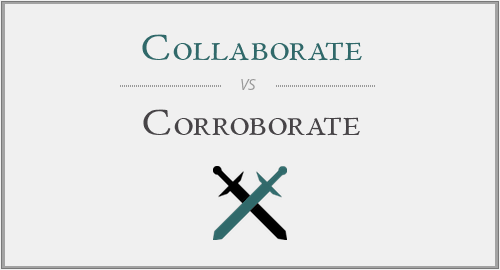If you are having a hard time deciding when to use the commonly confused words, collaborate and corroborate, you are not the only one. The words collaborate and corroborate don't fall under the category of homophones, but people do confuse them on occasion. This confusion causes more problems in speaking than in writing, which makes me think the misattributions are more a slip of the tongue than an actual lack of knowledge.
In this article, we will compare collaborate vs. corroborate. We will use each word in example sentences to illustrate its proper use and context. Plus, we will outline a mnemonic that you can use to decide whether collaborate or corroborate is the word you actually mean to use in your sentence.
Origin:
Collaborate originated in late 19th century: from Latin collaborat- ‘worked with’, from the verb collaborare, from col- ‘together’ + laborare ‘to work’. Corroborate originated in mid-16th century (in the sense ‘make physically stronger’): from Latin corroborat- ‘strengthened’, from the verb corroborare, from cor- ‘together’ + roborare, from robur ‘strength’.
Collaborate as verb:
Collaborate is used in English language where it means to work jointly on an activity or project.
He collaborated with him on numerous hotel projects.
Collaborate also means to cooperate traitorously with an enemy.
During the last war they collaborated with the Nazis.
Corroborate as verb:
Corroborate is also used as a verb in English language where it means to confirm or give support to (a statement, theory, or finding).

The witness had corroborated the boy's account of the attack.
Examples:
Alec Baldwin, Scott Eastwood to collaborate on cop thriller (The Indian Express)
Concrete Beach and Carnival Cruise Line Collaborate on Brewery at Sea (The Miami New Times)
The collaboration, which was announced in mid-December between the two companies, aims to provide a “seamless flow” of information between the Trimble Connected Farm solution, a web-based farm management solution that includes wireless data transfer, and Encirca Services, which are tailored decision services offered by DuPont Pioneer. (The Farm and Ranch Guide)
The defendant’s 16-year-old girlfriend told the court that he had been with her all night at a club, but refused to identify any friends or other witnesses who could corroborate that he was there. (The Guardian)
Still, to corroborate my thesis, I reached out to Genna Cifelli, a college teen (and my future sister-in-law) who has a smartphone surgically grafted onto her palm. (The Huffington Post)
The drama came to ahead on the most recent episode, with the women confronting Lisa over her actions – including her loyal ally Kyle, who refused to corroborate her version of event. (The Daily Mail)
Collaborate or corroborate:
Collaborate means to work with others on a project, to create something in conjunction with others. During World War II, collaborate also came to mean to cooperate with the enemy, as a back-formation of collaborator. Corroborate means to strengthen a theory, idea, finding or fact with supporting evidence. Corroborate often appears in legal and scientific contexts. Collaborate and corroborate are both verbs, but they mean different things. If you notice that the word collaborate contains the word labor, it should be easy to remember that collaborate means to work together. This way, you will always know which verb to choose.




Have a discussion about this article with the community:
Report Comment
We're doing our best to make sure our content is useful, accurate and safe.
If by any chance you spot an inappropriate comment while navigating through our website please use this form to let us know, and we'll take care of it shortly.
Attachment
You need to be logged in to favorite.
Log In